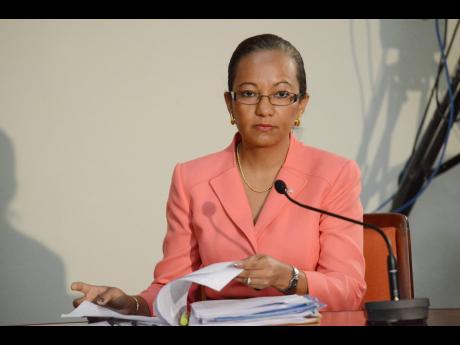Slow Labour causes loss of grant funding
The Jamaica Government lost more than US$202,000, or just over $28.4 million, in grant funding because of the Ministry of Labour and Social Security’s slow implementation of a project for poor, disabled people, according to the findings of the Auditor General’s Department.
The funds were part of a grant being provided by the International Bank for Reconstruction and Development, which was solely funding the Jamaica social and economic inclusion of persons with disabilities project under the Programme for Advancement Through Health and Education, or PATH.
The objective of the project was to assist the Government to increase the employability and skills development of poor persons with disabilities and improve the service delivery of special-education needs to poor children with disabilities.
The 2018-19 annual Auditor General’s report, tabled in Parliament just over a week ago, said that despite receiving a one-year extension to August 14, 2018, the project was only able to spend US$2.7 million, or 93 per cent, of the US$2.9 million grant funding.
As a consequence, the Government lost US$202,341.34 in grants. The Auditor General’s Department said its review revealed that the underutilisation of the grant funding was due mainly to the training consultant’s delay in submitting a final report as well as invoices within the disbursement period.
Consequently, the Government had to provide US$160,172, or just over $22 million, at the existing rate of exchange, from another unnamed source to pay for the training, which was done subsequent to August 2018.
The report also noted that at the time the project was to close in August 2018, only nine per cent of the targeted 550 children with disabilities received assistive aids. Assistive aids include mobility devices such as wheelchairs, scooters, walkers, canes and crutches; hearing aids; and computer or electrical devices.
FAILED ASSESSMENT
In addition, the Auditor General’s report said that the project did not receive 469 assistive aids procured at a cost of US$136,605 until five months after the project ended. “Our investigation disclosed that the tardiness was due to the project team’s failure to conduct timely needs assessment,” said the report, submitted by Auditor General Pamela Munroe Ellis.
Moreover, up to the time of reporting that the Labour Ministry provided evidence that only 50 persons had received assistive aids.
Permanent Secretary Colette Roberts Risden did not respond to Financial Gleaner requests for comment on the report.
The Auditor General also pointed to control weaknesses under the integrated support to Jamaica’s social protection strategy project, funded by a US$50 million loan from the Inter-American Development Bank with counterpart funding by the Jamaica Government.
The project is to support consumption, protect and promote the human capital of PATH beneficiaries, and strengthen the capacity of the ministry to improve quality and access to social services provided to the poor and vulnerable population.
The report said that at the time of the audit, the reconciliation of the bank account through which PATH beneficiary payments are made was six months in arrears – January 2019 being the last time that was done – and that the December 2018 reconciliation statement included items amounting to $15.6 million, dating as far back as 2006.
The report said that PATH indicated that the reconciliations were not completed due to system-related issues with the accounting software while noting that $2.7 billion was paid out during the period that reconciliations were not done.
PATH also failed to surrender money unspent by the social-protection project to the Consolidated Fund as required by law.
The department said it observed that as at December 2019, $172.12 million that was unspent on the project, which ended in March 2018, remained in the Government’s administrative account.
“Where monies are left in bank accounts after the closure of projects, the ministry is exposed to unauthorised expenditure, which may bypass established budgetary and commitment control process,” the Auditor General’s Department said.
PATH subsequently advised that the $172.12 million represented stale-dated cheques but did not provide evidence and an updated reconciliation statement to support the claim despite the Auditor’s General’s Department requests, the report said.

